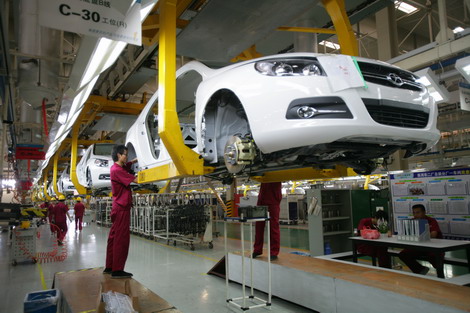Chinese automakers hunt for sweet spot in Brazilian market
Updated: 2011-08-09 10:53
By Li Fangfang (China Daily)
|
|||||||||||
|
 |
|
A Jianghuai Automobile Co Ltd production line in Hefei, Anhui province. The company plans to invest $600 million in a production plant in Brazil to help raise its global market share. [Photo / China Daily] |
The booming demand for autos in Brazil, the world's fourth-biggest vehicle market, offers attractive market potentials for Chinese automakers to garner volume sales.
Last week, Chinese automaker Jianghuai Automobile Co Ltd, also known as JAC Motors, said it is planning to invest $600 million in a production plant in Brazil, following the likes of Chery Automobile Co Ltd and Lifan Industry (Group) Co, in a bid to raise its global market share by increasing sales in the Portuguese-speaking country in South America.
According to JAC Motors' draft plan, the facility in Brazil will have a production capacity of 100,000 units annually, once production begins in 2014.
The idea of setting up a factory in Brazil originated from the South American country that has been the major destination of JAC vehicles outside China.
She Cairong, vice-general manager of JAC in charge of international business, said that "JAC vehicles are becoming popular in Brazil, with more orders than our supplies". The automaker started sales for the Brazilian market in March. With a network of 50 dealerships across 28 cities in Brazil, JAC said it exported 20,000 passenger cars to the country. The automaker expects monthly sales to average 3,000 units.
JAC started construction of a vehicle assembly plant in Argentina on May 16, which assembles JAC vehicles from knocked down kits sent from China.
JAC said that its decision to build an assembly plant in Argentina came in response to strict restrictions imposed on imports by the Argentine government.
Attractive markets include Mexico and Bolivia. JAC had sent a delegation to Mexico to better understand the market conditions there. In June JAC opened a sales center in Bolivia.
"JAC is the latest Chinese automaker looking to expand its operations in emerging markets as growth in the Chinese market slows and competition heats up," said Namrita Chow, senior analyst with research company IHS Automotive.
"If Chinese automakers can ensure adequate brand recognition in Brazil, the market offers good growth potential amid slowing overall growth rates in China."
IHS Automotive data showed that in 2010, there were 2.6 million passenger car sales in Brazil. By 2015, passenger car sales will have risen by 33 percent, and by 2020 passenger car sales are likely to have increased to over 4.5 million units. However, JAC will face competition from other Chinese automakers, who are hoping to capture a slice of the same market. Chongqing-based Lifan announced its plans of building an assembly plant and research and development center in Brazil on July 1, with a combined investment of $130 million.
Meanwhile, Chery Automobile has already begun construction of a $400-million plant in Brazil that will become operational by the end of 2013, with initial capacity of 50,000 units annually. The plant will eventually be expanded to handle a capacity of 150,000 to 170,000 units a year.
The three Chinese automakers have to strengthen their branding and image in the Brazilian market, if they want to win market shares from existing and new players, said analysts. The Brazilian market is currently dominated by Fiat SpA and Volkswagen AG, followed by General Motors Co, Ford Motor Co, and PSA Peugeot Citroen.
These established global players are themselves battling in the Brazilian automotive market through huge financial investments and accelerating product launches in order to maintain and expand their market shares.












